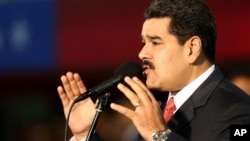President Nicolas Maduro again fumed against Venezuela's poor credit rating on Monday, saying the OPEC nation needed external financing to help it cope with oil price declines.
The socialist government has seen bond prices plunge, loan costs rise and market speculation of default emerge this year amid an economic slowdown exacerbated by a declining price of oil, which accounts for 96 percent of export revenues.
In near-daily speeches, Maduro, the successor to the late Hugo Chavez, insists that despite the oil slump, Venezuela has sufficient funds to cover all its external debt commitments and remains a well-resourced nation with the world's biggest crude reserves.
“The risk rating companies have put the country's risk at practically the highest in the world, more than countries in war or suffering the ravages of Ebola,” he complained, repeating allegations of a hostile international campaign.
“There is a financial blockade against Venezuela to stop us from accessing the financing we need to counteract the reduction in oil revenues,” Maduro added in a speech.
Oil dived 4 percent to five-year lows on Monday, with Brent settling at $66.19 a barrel and U.S. crude $63.05.
Venezuela's export basket closed last week at $61.92 per barrel - compared with $96 per barrel in July. Maduro has said Venezuela is losing 35 percent of its revenues, and ordered a 20 percent cut to non-core budget items.
The president did not specify what further financing Venezuela would like. Its last debt sale was in May when state oil company PDVSA issued $5 billion of 2022, 2023 and 2024 bonds - but those were a private placement with state banks.
Venezuelan bond yields remain the highest among emerging markets, with spreads over comparable U.S. Treasuries at 2,072 basis points. That compares, for example, with 1,517 for conflict-torn Ukraine.
Economists recommend Venezuela enact reforms like a currency devaluation or rise in domestic gasoline prices, but Maduro appears to be balking at such measures which could worsen already high-inflation and cause a social backlash.
Short-term financing options include rolling back generous Chavez-era oil subsidies under its regional Petrocaribe program, more loans from ally China, or selling assets of its Citgo refining unit in the United States.
“The strategy appears as mostly a piecemeal approach and focused on one-off sources of financing as opposed to a solution to the oil price shock,” said Siobhan Morden, head of Latin America strategy at Jefferies in New York.





